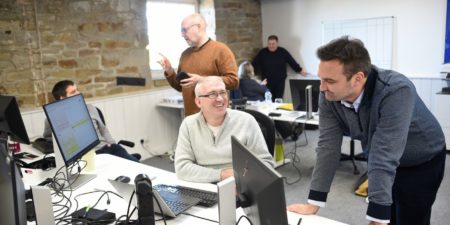Ready to explore the possibilities?
Request a quick call with our team to find out how the Innovation Explorer program can help your business take its next big leap into AI and automation.

How to escape the trap in your own business — and grow
Last year, my 18th year at the helm of a company I founded, was incredibly busy: pitching, delivering, growing, recruiting, networking, rinse, repeat… it had been hard to look up, step back and look again. I was fully immersed, involved in everything I thought was important. I now know that taking that step back is important too.
Anyone who knows me will tell you I like to meet people and have a good natter. Awards ceremonies are fun opportunities to catch up . Count me in, I’ll make time for that! At one such event, I bumped into a fellow agency leader, a guy I like and trust (who says the competition has to be the enemy?). He’d just completed a leadership course; one we’d both signed up for some months earlier with enthusiasm, but to which I hadn’t yet made the time to commit.
It’s fantastic, he told me. Do it. You need to do it. Ah, but I’m busy, I protested, lots of things happening. Blah, blah, blah. Same as ever, for me and many others like me.
What he told me about his experience put an end to my excuses. I wanted what he’d had, and I wanted to grow my digital agency faster than it already was. I jumped right in.

Leadership training: look at this inspired group! I’m back row, centre.
The course was a philanthropic programme billed as providing greater access to education, capital and business support services in the UK. On a practical level, it’s all these things but, in fact, I came away with so much more. It was fully-funded — all I had to do was commit time and buy a few train tickets… Wait, what about my business? Who would take on all of the stuff I did every day?
First lesson: the leader’s absence from (most of) the day-to-day for 10 weeks will not kill the business. It wasn’t like I was out of the country for all that time, plus I could still get a hand in what was going on at the studio remotely… This, for me, was about letting go a little and trusting my brilliant team to do their jobs without my presence. What’s the saying — if you can’t trust the people who work for you, why did you hire them?
It was fully-funded — all I had to do was commit time and buy train tickets. Wait, what about my business? Who would make sure everything was okay?
There was no mistaking this was going to be intense. And I was excited — the reported average growth of the course alumni is 85% following graduation. Over 10 weeks, I completed three webinars and attended a ‘growth group’. Every few weeks, I travelled between the North West and Oxford for three-day residentials with around 35 other business leaders from around the UK.
(Meanwhile, back at the office, websites got built and optimised, and acquisition continued to help our clients make money – all without me being around… )
Right from the start I was asking questions and, in return, being asked to share. The various activities inspired me by encouraging subtle shifts in perception and attitude. I’m particularly glad I seized the optional sessions with topic specialists — a full day on finance was (believe it or not) genuinely a remarkable business day of my life. Not just accounting, but a deep-dive into how executives and finance professionals think about money.
Leaders are supposed to look like they aren’t doing much.
We had one piece of work to hand in at the end — the Business Growth Plan: our personalised road map to growth that incorporates people, finance, cash flow and identifies opportunities and what needs to change. My plan consists of three items. Just three that will grow us. The items on this list are my focus. I have also graduated from the course with a revised definition of my role in my own company. It’s very positive. I’ll be doing a lot more work on my company to help it grow, not running around working in it to make it grow.
It’s a familiar story, isn’t it? Leaders get trapped into working in the business — though we should be working on it. We make this trap for ourselves. And I should know better — I’ve been on leadership courses before that have held a mirror up to this. There was something about this course and the timing and my mindset that shifted my understanding. A month or so after the course has finished, I’m still not sure what or exactly how it happened! But it has:
- Stimulated discussion and new thinking
- Made an attitude adjustment to growth
- Dominated my thinking in a positive sense
- Made me more assertive
- Forged a commitment to numbers
- Inspired me and given me motivation to change things
- Forced me to define my vision
- Married new concepts and familiar ones
In case we don’t meet up at a networking event or for a coffee in town any time soon, I need to tell you what my fellow agency owner told me: do it.
Some key takeaways
The course I attended was the Goldman Sachs’ 10,000 Small Businesses. It may or may not be the course for you. Find one that is and don’t put something like this off. Make the time, especially if you feel trapped in your role, snared by the day-to-day of business and not the bigger picture. Never mind the blah, blah, blah excuses. Do it!
- You do need to use other people’s money to grow at pace
- Make time for downtime, make space, hire and delegate
- Leaders are supposed to look like they aren’t doing much
- Growth is best achieved by 90-day sprints — not vague plans for the next financial year
- Hire people that are better than you! Don’t be afraid of brilliant people
- This is your business but you shouldn’t be irreplaceable
This article was first published on Medium.
-
 21.05.2019|Anecdotally, we know a high percentage of new clients are running away from an agency they weren’t happy with. But a rocky relationship is easy to fix if you set and meet expectations with openness and honesty.
21.05.2019|Anecdotally, we know a high percentage of new clients are running away from an agency they weren’t happy with. But a rocky relationship is easy to fix if you set and meet expectations with openness and honesty. -
 01.07.2021|Door4 is 21 this year. Our Founder and Director Leon Calverley explains how people have been at the heart of the digital marketing agency’s success.
01.07.2021|Door4 is 21 this year. Our Founder and Director Leon Calverley explains how people have been at the heart of the digital marketing agency’s success. -
 23.07.2021|Door4 are expanding our Lancashire and Manchester teams, in 2021. Are you a good fit for our business? Do you want to join a progressive, results-driven digital performance agency?
23.07.2021|Door4 are expanding our Lancashire and Manchester teams, in 2021. Are you a good fit for our business? Do you want to join a progressive, results-driven digital performance agency?
Door4 opinions and insight.
We have a lot to talk about.Our latest articles, features and ramblings.
We explore performance marketing, AI, communications and optimisation.











